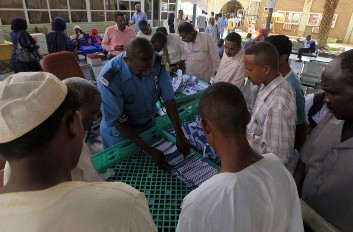Sudanese authorities to crack down on illegal residents
March 23, 2014 (KHARTOUM) – The Sudanese ministry of interior has announced it would apply legal measures against foreign nationals who have not legalised their residency in accordance with immigration rules as of 1 April 2014.

He called on foreigners to complete registration by the end of the current month, noting that legal residents and registered refugees are not targeted by the inspection campaigns which will be launched following the deadline.
Ali further pointed that they held meetings with foreign embassies in Khartoum in order to ask them to push their nationals to legalise their status.
Several Sudanese states particularly in the east have applied strict measures to control their borders with neighbouring countries.
This week, the city of Kassala in eastern Sudan announced that government agencies are implementing strict measures in border areas to stop human trafficking as well as food and fuel smuggling to neighbouring countries.
The mayor of Kassala locality Osman Mohamed Nur told the government-sponsored Sudanese Media Center (SMC) website that the recently enacted federal law on the prevention of human trafficking and smuggling, as well as state legislation, have contributed to curbing the phenomena.
Thousands of Eritreans have fled repression in their homeland, which is referred to as the North Korea of Africa, usually transiting via Sudan and Egypt en route to Europe, Israel or other countries.
At a border conference held in Morocco earlier this month, the state’s minister at the ministry of interior, Babiker Ahmed Digna, said Sudan had requested further support for its efforts to fight human trafficking, saying the UK and several other European countries have responded positively on the basis that Sudan is considered a passage country for refugees heading to Europe.
(ST)
